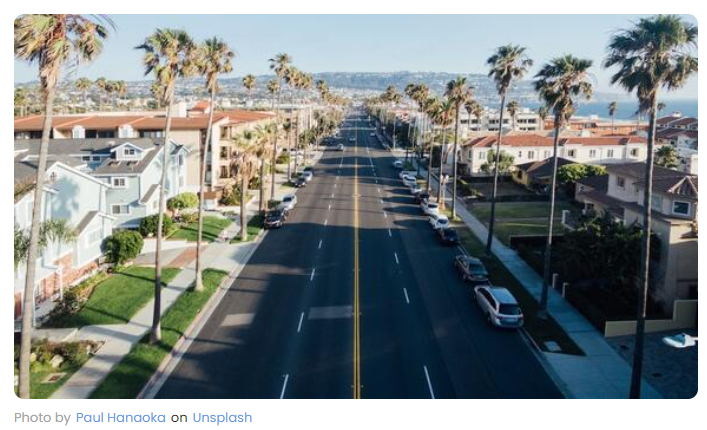|
Join my conversation with Dr. Judge Glock, director of research and a senior fellow at the Manhattan Institute, on the latest Let People Prosper Show podcast.
We explore: 🗽 America's Economic Landscape: What's working and what's not? 🏠 Housing Market Fixes: Key issues and practical solutions. 💸 Debt Crisis Solutions: National and local debt challenges and how to tackle them. Like, subscribe, and share the Let People Prosper Show, and visit vanceginn.substack.com and vanceginn.com for more.
1 Comment
Pros and Cons of Using a Home Equity Line of Credit to Pay Off Your Mortgage: Interview on NTD News5/22/2024 With house prices surging recently, the average American homeowner now has around $300,000 of equity in their home. With the cost of living also soaring, many homeowners are considering taking out a home equity loan, or HELOC, to pay off their mortgage. But how exactly do such lines of credit work, and are they a good idea?
NTD’s Evelyn Li spoke with Vance Ginn, the former chief economist at the White House’s Office of Management and Budget and the president of Ginn Economic Consulting, to find out more. Interview on NTD News on May 22, 2024: https://www.ntd.com/pros-and-cons-of-using-a-home-equity-line-of-credit-to-pay-off-your-mortgage-economic-consultant_994520.html Originally published at Dallas Express.
Home “owners” in Dallas and surrounding cities find themselves grappling with the weight of unaffordability as property taxes soar, increasing by $120 million despite the touted cuts at the end of 2023. A recent study reveals the burden on renters in Texas and nationwide, with many paying over 30% of their monthly income on housing. A factor contributing to this rising cost of renting, and housing in general, is soaring property taxes. The predicament stems from excessive state and local spending and purported property tax “cuts” that too often merely shift the burden through exemptions. Renters, technically anyone with a monthly payment or a mortgage since homeowners are just renting from the government, bear the brunt of this financial strain, emphasizing the urgent need for fiscal reform. Late last year, Dallas residents witnessed a modest one-cent property tax reduction rate, with surrounding cities experiencing varying degrees of reduction. Fort Worth saw a 4-cent reduction, and McKinney a 3-cent reduction. Despite these adjustments, most cities, including Dallas, faced increased property taxes eclipsed by rising spending and housing appraisals. Even in Plano, recognized for its low property taxes in the DFW area, homeowners will endure higher monthly property tax amounts due to home valuation hikes. The incongruity between property tax decreases and housing cost increases is alarming, prompting a closer look at the numbers. According to Axios, the average taxable value of homes in Denton County rose from approximately $402,000 in 2022 to around $449,000 in 2023. Similarly, the average market value of Collin County homes increased from about $513,000 in 2022 to roughly $584,000 in 2023. One doesn’t need to be a mathematician to recognize how a property tax decrease of even a few cents doesn’t begin to keep pace with skyrocketing home valuations and rent. No wonder 20% of Dallas homebuyers looked to get out of the city last year. The crux of the issue lies in reining in local spending. The axiom holds: the burden of government is not how much it taxes but how much it spends. Dallas, with its escalating budget that reached a historic high last year, renders proposed property tax cuts inconsequential. My new research released by Texans for Fiscal Responsibility highlights how property taxes continued to go up last year by $165 million, even with the Texas Legislature passing $12.7 billion in new property tax relief. This ended up being the second largest property tax relief in Texas history, not the largest as many politicians have been claiming since last July, which is what I wrote then. The best path for Texans is to finally have their right to own their prosperity instead of renting from the government by paying property taxes forever. This can be done by restraining state and local government spending and using resulting state surpluses to reduce school property tax rates until they’re zero. And by local governments, including Dallas, using their resulting surpluses to reduce their property tax rates until they’re zero. Dallas must adopt a spending limit, one that does not permit the budget to exceed the rate of population growth rate plus inflation – a measure aligned with what the average taxpayer can afford. Performance-based budgeting and independent efficiency audits, preferably conducted by private auditors, should identify opportunities for improvements and reductions in ineffective programs, helping provide more opportunities for property tax relief. Dallas leaders can empower their constituents by redirecting taxpayer money to them while funding limited government. The adoption of these strategic measures not only benefits homeowners but extends its positive impact to renters and business owners, providing tangible rewards for their hard work and fostering a more economically vibrant community. Dallas leaders are responsible for ushering in a new era of fiscal responsibility that ensures affordability for all residents and supports sustained economic growth. The path to long-lasting property tax relief is clear: let’s seize this opportunity for positive change and secure a brighter, more prosperous future for Dallas. Episode 77 is with Dr. Mark Calabria, former chief economist of former Vice President Mike Pence, senior advisor at Cato Institute, and author of “Shelter from the Storm: How a COVID Mortgage Meltdown Was Averted.”
Today, we discuss: 1) His lessons learned from working as Former Vice President Mike Pence's chief economist; 2) How he helped the nation avert a mortgage crisis during COVID and issues with pandemic policies and their ongoing impacts; and 3) Why was the economy in 2019 so successful, and what should be done to improve things in 2024? Check out Mark's book: https://www.cato.org/books/shelter-storm Please like this video, subscribe to the channel, share it on social media, and provide a rating and review. Also, subscribe and see show notes for this episode on Substack (www.vanceginn.substack.com) and visit my website for economic insights (www.vanceginn.com). Click below to watch the episode and read on for show notes: Today, I cover:
1) National: Shocking findings from the Fraser Institute's newest "Economic Freedom of the World Report," especially as it relates to the U.S. and Hong Kong, the Fed not raising interest rates, and the average 30-year mortgage rate reaching its highest since Nov. 2000; 2) States: My new co-authored report published by the Pelican Institute highlighting how Louisiana could become "the next big thing” with tax reform and responsible budgeting, and why Colorado's Taxpayer's Bill of Rights (TABOR) is under attack; and 3) Other: My recent articles on the DOJ's antitrust lawsuit against Google and Constitution Day. You can watch this TWE episode and others along with my Let People Prosper Show on YouTube or listen to it on Apple Podcast, Spotify, Google Podcast, or Anchor. Please share, subscribe, like, and leave a 5-star rating! For show notes, thoughtful insights, media interviews, speeches, blog posts, research, and more, please check out my website (www.vanceginn.com) and subscribe to my newsletter (www.vanceginn.substack.com), share this post, and leave a comment. Click below to watch the episode and read on for show notes: We discuss:
1) Why he believes an economic bust is coming based on lending activities and economic indicators, and where there's corruption in the banking industry; 2) How high home mortgage rates after low rates during the pandemic are restricting supply, and how this affects the housing market; and 3) How the U.S. can rebuild its waning creditworthiness by Congress balancing the budget and putting taxpayer dollars to better use, and his thoughts on the Teacher Retirement System of Texas. Dory’s bio:
For show notes, thoughtful insights, media interviews, speeches, blog posts, research, and more, please check out my website (www.vanceginn.com) and subscribe to my newsletter (www.vanceginn.substack.com), share this post, and leave a comment. TRUTH On Inflation, Housing Market, Interest Rates, & Incentives w. Dr. Chuck Beauchamp | Ep. 445/16/2023 In today's new episode of the "Let People Prosper" podcast, I'm thankful to be joined by Dr. Chuck Beauchamp for a thought-provoking discussion on new inflation numbers and the current economy. We discuss: 1) The newest inflation numbers and how the rate is impacting various markets including food, housing, and energy; 2) Interest rates' impact on the housing market and the crisis of affordability; and 3) Why the U.S. dollar's status could continue to wane and more. You can watch this interview on YouTube or listen to it on Apple Podcast, Spotify, Google Podcast, or Anchor (please share, subscribe, like, and leave a 5-star rating). Chuck’s bio:
Find show notes, thoughtful economic insights, media interviews, speeches, blog posts, research, and more here at my website (https://www.vanceginn.com/) or Substack newsletter (https://vanceginn.substack.com). Please subscribe to the newsletter, share it with your friends and family, and leave me a comment. It's no secret that relocators have recently favored moving to Florida. Recent data from the Florida Department of Motor Vehicles shows that people from New York, New Jersey, and California are among the states with the most people applying for Florida driver's licenses. In fact, according to the New York Post, the data showed that around 30,000 Californians applied for a Florida license in 2022.
Economist Vance Ginn believes he knows one of the major reasons that Californians are coming to Florida, and he believes it is fueled in part by saving money, as follows. Cheaper Housing Fueled by Fewer Roadblocks to Real Estate Development: Ginn, who is chief economist at the Pelican Institute for Public Policy, recently co-authored an opinion piece in the Washington Examiner. In it, he laid out his argument that the primary motivation for relocating Californians to Florida and Texas is housing affordability, writing, in part: "Housing affordability has been a major factor driving Californians to states such as Texas and Florida, where they can realistically afford the American dream of owning a home."Ginn further explains that Florida and Texas have less expensive housing because they implement fewer "bureaucratic bottlenecks" for real estate development, writing: Florida has done a good job winning the war against excessive regulation to make way for more home construction...It’s not complicated: The states and cities that will prosper in the coming decade will be those that allow a less regulated housing market so the quantity of housing supplied can efficiently meet the quantity demanded." U.S. News & World Report did conclude that California was the most regulated state in America. And although Ginn's article is written as an opinion piece, there is some evidence to support some of its claims, as follows. California has 4 of the 10 Most Expensive Cities in the United States: According to a 2022 study by Rocket Mortgage, the markets of San Francisco, Los Angeles, San Jose, and San Diego were among the 10 most expensive cities in the United States, making up almost half of the country's most expensive places to live. Generally Speaking, Housing in California is Much More Expensive than Housing in Florida: Although Florida's real estate markets have risen dramatically, they are still reasonably priced when you compare them to California's. According to Zillow, the average home value in Florida is $404,939. In California, that same number is $760,644. So while some Floridians and those wishing to buy a home in Florida may lament the rising real estate markets, someone coming from California may see Florida real estate prices as a bargain. Differences in State Income Tax: Although Ginn's writings didn't bring up the differences in state income tax, there are key differences between these two states that affect the cost of living. California's state income tax ranges from rates of 1% to 12.3%, and the sales tax rate is 7.25% to 10.75%. Florida does not have a state income tax, and its sales tax rate is 6%. Originally published at Newsbreak. California Gov. Gavin Newsom boldly — and a wee bit desperately — ran ads last summer encouraging Florida residents to relocate to California . Housing affordability is one reason it probably won't work.
Housing affordability has been a major factor driving Californians to states such as Texas and Florida, where they can realistically afford the American dream of owning a home. Cost of living — which is mainly a housing problem — and taxes round out the top motivations for fleeing the once-growing states such as California. The states that win on housing affordability from free-market-oriented policy win overall. Twenty years ago, few would have bet on a mass exodus of residents from the popular albeit highly regulated housing market in California. Issues related to land use, zoning, and bureaucratic chaos led to substantially higher housing costs. The five most expensive housing markets nationwide are all within California. Further, a recent Hoover Institution report found that one of the top reasons companies leave California is “... high living costs, particularly the cost of housing affordability.” In the same vein, C2ER finds that California’s housing costs are about 1.7 times greater than Florida’s and 2.2 times higher than Texas’s. This contributes to California suffering losses of big businesses (11 Fortune 1,000 companies) between 2018 to 2021, along with small, quickly growing companies. Texas and Florida have figured out the secret to housing affordably through free-market policies that help entrepreneurs address challenges to build more homes in a safe, less costly manner. The recent census report shows how Florida drew the most net new domestic residents (318,855), with Texas coming in second (230,961). Many people packed up and moved to states with “lower taxes, more affordable housing and a higher standard of living.” What’s more, Texas came in first in overall population growth (470,708), with Florida second (416,754). These states are the ones that tend to let builders build more freely than the others. The Wharton Residential Land Use Regulation Index , one of the most respected analyses of the effect of regulation on price, shows a strong, positive correlation between house prices and over-regulation. Take, for example, San Francisco, where it takes 861 days to get a permit for one residential home. In Houston, it takes just 15 days . That’s huge savings for homebuilders and, therefore, homeowners. For Texas to remain competitive, it must guard against bureaucratic bottlenecks like those developing in Austin, where simply getting residential site plans approved now takes one to two years . To remain prosperous, Texas must keep and improve on free-market principles, especially in housing. Otherwise, the resulting higher costs of living will force people and businesses elsewhere. Florida has done a good job winning the war against excessive regulation to make way for more home construction. In 2019, the Sunshine State passed a law allowing third parties to help streamline the permitting process, alleviating wait times for home construction. In 2021, it passed a shot-clock law that effectively limited permit responses by cities to no more than 30 days. It’s not complicated: The states and cities that will prosper in the coming decade will be those that allow a less regulated housing market so the quantity of housing supplied can efficiently meet the quantity demanded. For states that plan to attract business while retaining residents, they must improve the regulatory environment for builders by getting out of the way. This should include streamlining building regulations to make it easier to build new housing, reforming land use policies to encourage development, and sorting out the bureaucratic bottleneck that complicates the building process. Like musical chairs, if you have fewer chairs than people, some people have to find a new home … or a state. Vance Ginn, former associate director for economic policy in the White House Office of Management and Budget, is president of Ginn Economic Consulting, LLC , chief economist at Pelican Institute for Public Policy, and senior fellow at Young Americans for Liberty. Nicole Nabulsi Nosek is the founder and chair of Texans for Reasonable Solutions. Originally published at Washington Examiner. |
Vance Ginn, Ph.D.
|




 RSS Feed
RSS Feed